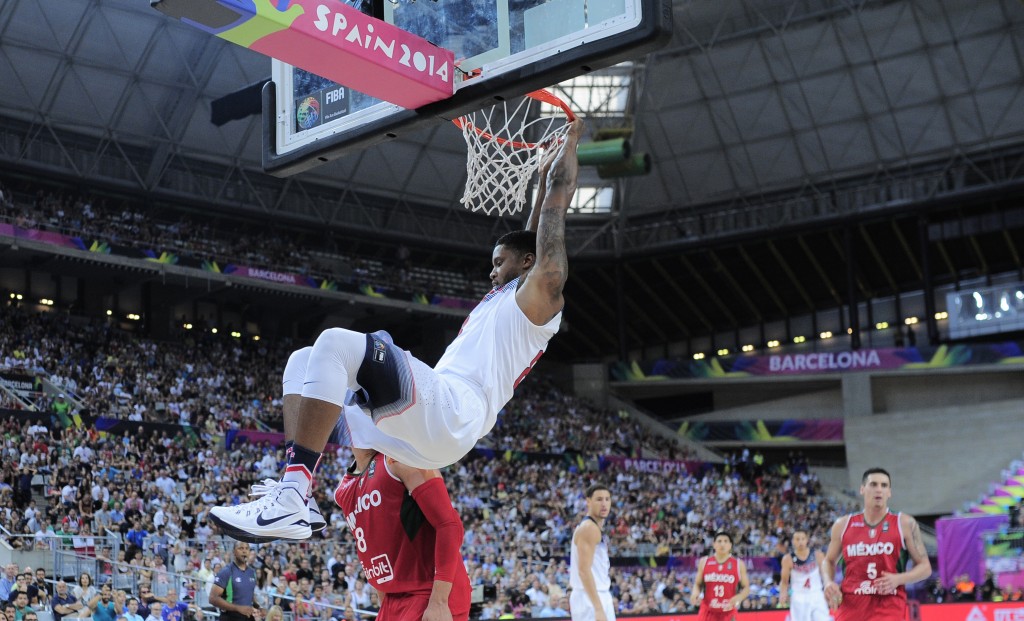International basketball not the same as US game

Rudy Gay of the U.S. dunks over Mexico during Basketball World Cup Round of 16 match between United States and Mexico at the Palau Sant Jordi in Barcelona, Spain, Saturday, Sept. 6, 2014. The 2014 Basketball World Cup competition will take place in various cities in Spain from Aug. 30 through to Sept. 14. AP
BARCELONA — The basketball was bouncing away, threatening New Zealand’s last-chance possession, though if a player could just dive on the floor and corral it, any NBA fan would know what to do.
CALL TIMEOUT!
Article continues after this advertisementNope. Couldn’t.
That’s not allowed in the international game.
Trying to win is sometimes secondary to losing close — but better not be too blatant if your priority isn’t winning at all.
Article continues after this advertisementTurkey trailed by six in the final minute of another contest, and when its opponent inbounded the ball, surely the Turkish bench would scream out the instruction obvious to Americans.
FOUL!
Nope. Wouldn’t.
Welcome to basketball, international style. Same name, not quite the same game as in America. Not in the way the sport is played, officiated, or strategized.
“It’s similar, but in anything, you take something from the East Coast to the West Coast in the United States, it’s a little bit different,” US coach Mike Krzyzewski said.
Being a successful coach in international tournaments requires more than just a good playbook. Sometimes it takes a good calculator.
American coach Mike Fratello learned that the hard way.
In his first tournament leading Ukraine in 2011, his team was eliminated by a point differential tiebreaker. So the longtime NBA coach wasn’t particularly surprised at this World Cup when Turkey opted not to foul in the last 30 seconds of its first-round matchup with the Ukrainians, settling for a six-point loss rather than try to prolong the game and risk losing by eight.
“We know from our first year that we did not advance to the next round because of point differential,” Fratello said. “We were tied with two other teams, Georgia, ourselves and Bulgaria, the three of us tied with 2-3 records. Georgia moved on because of point differential. So it’s huge here, it really is.”
Unfortunately for the TV analyst known as the “Czar of the Telestrator,” Fratello still isn’t a math maestro. His squad was again ousted on point differential even more painfully, falling short by one point.
Lose close, lose big, whatever. Sometimes, all that matters is losing.
Teams seem more than willing to throw games for what coaches feel would be a more favorable matchup.
Spain appeared to do it against Brazil in the 2012 Olympics, moving the Spanish to the other half of the bracket so they didn’t get the Americans until the gold-medal game.
And that seemed the mission at this World Cup for Australia in its final game of group play against Angola, when the Australians rested regulars, played defense with the intensity of a Spanish siesta, and blew a big lead in falling 91-83. That dropped them out of position to face the US until the semifinals, with an intent that looked so obvious that Fiba has launched an investigation.
When it happened, Slovenia’s Goran Dragic blasted them on Twitter. But despite his anger, the Slovenians eventually blamed themselves for not double-checking their path and their math.
“Like I said, this is our fault. Other team, they calculate, we didn’t,” said Dragic’s brother, Zoran.
As for the game itself, there are other differences:
- The Fiba version is shorter than the NBA’s by eight minutes, with a closer 3-point line and a different ball.
- Only coaches can call timeouts — US guard Kyrie Irving forgot that in an earlier game — and only when the ball isn’t live, negating the ability to regroup if a possession is going poorly.
- Travelling calls. Americans get whistled for the violation a lot in international competition, either because they’re too slow to adapt to the way referees see it, or too quick for the officials to think their moves are legal.
Some changes have been made to bring the games together — the Fiba key that was formerly a trapezoid is now also rectangular. NBA president Rod Thorn said there have been discussions for decades about how to adopt a universal set of rules, like football.
“What we found, even though we’ve still gotten a lot closer, is that it was so hard for them to change certain things because of all the different federations … that they have,” Thorn said.
“They’ve been doing things a certain way for so long they didn’t want to change, and it was just much more difficult — a lot of their federations had no money, couldn’t institute changes that cost anything.”
NBA owners have resisted some change, too.
One of the most notable rules they oppose is the international game allows defensive players to swipe the ball off the rim, which in America is basket interference. Thorn said the 3-point arc was moved in at one point, but league officials felt it was too close.
Still, the games are much more similar than when NBA teams competed in the former McDonald’s Open tournaments in the late 1980s. The games were so different that Thorn said they were officiated under a mixture of rules, rather than require the international clubs to learn the NBA’s illegal defense rules.
He represents the US on a committee that meets annually with FIBA rules officials to discuss further changes to the game. But there may never be a uniform one.
“I don’t know if it’ll get to be the same,” Thorn said, “but it’ll continue to get closer.”
RELATED STORIES
Fiba World Cup: Can anyone slow down US, Spain?